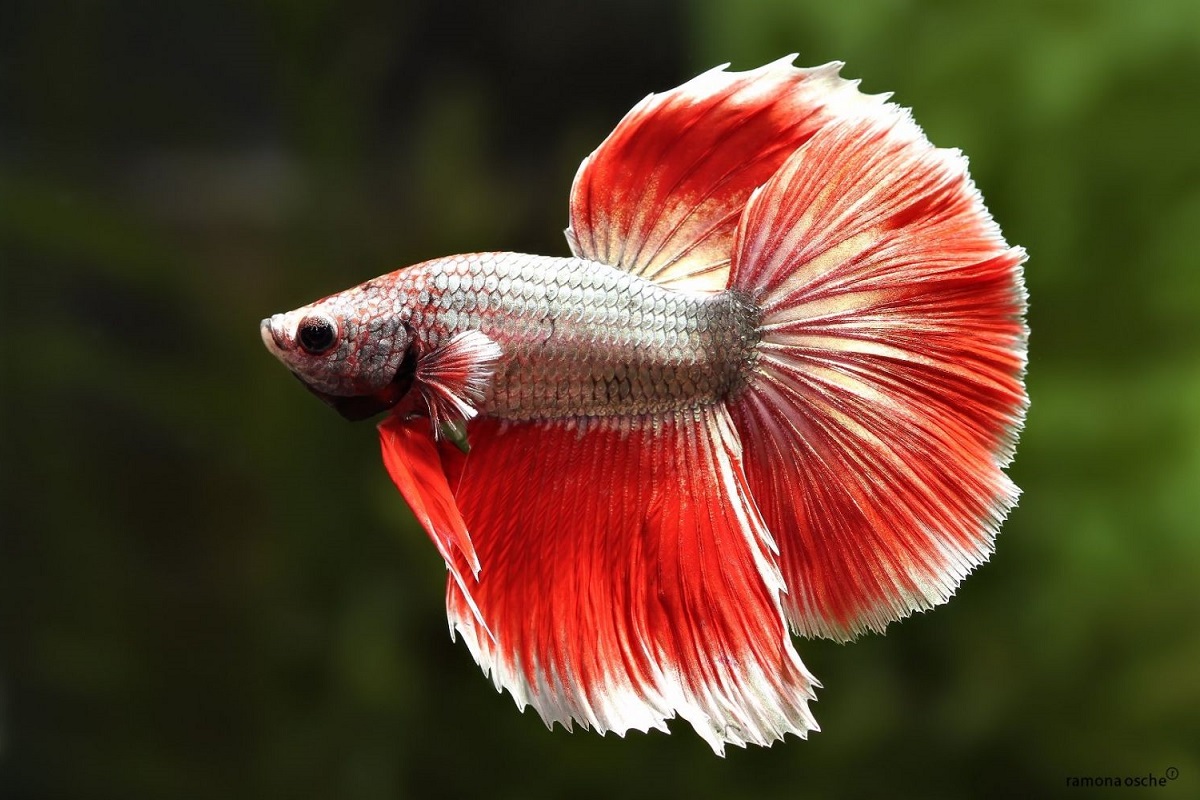Owning Betta fish is an absolute delight, bursting with hues and patterns that enchant and captivate!
Ever noticed your betta sporting some new, unexpected white speckles where there once was uniform color? It’s sure to stir up concern.
Ich is a common parasitic infection in betta fish that causes white spots.
Enter Ich: the pesky parasitic invader notorious for dotting your betta with white spots. While potentially fatal, there’s no need to panic—timely action can turn the tide against this aquatic adversary.
Dive in with us as we navigate the waters of Ich infection, detailing how to effectively vanquish this parasite and secure a spot-free existence for your betta’s tank!
Contents
What Is an Ich?
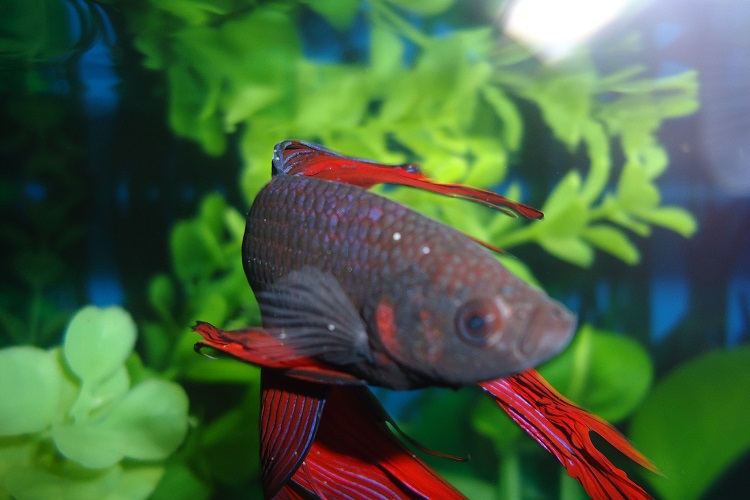
An Ich is a parasite that has the scientific label Ichthyophthirius multifiliis. It goes by a couple of common names aside from Ich, including:
- Ick
- White spot disease
Betta fish aren’t the only species susceptible to Ich; any freshwater fish can fall victim to this ciliated protozoan.
Unfortunately for fish owners, Ich has a direct life cycle. Therefore, it doesn’t need an intermediary host to complete its life cycle, making it highly contagious if your betta shares a tank with other fish.
The Ich parasite has the potential to multiply into hundreds of new parasites in a single generation. That differs from many other protozoans, which reproduce by splitting into two.
If this sounds a little too gloomy for you, here’s the silver lining: Ich can only live in the presence of live fish. Therefore, it’s easy to rid your tank of Ich by removing your fish.
But our goal is not to let it come to that—it’s possible to treat Ich if you catch it early enough, and we’ll show you how.
Stages of the Ich Lifecycle
It’s crucial to grasp the Ich’s lifecycle to understand how it affects your betta fish. Ich undergoes a three-stage process as follows:
- Trophont
- Tomont
- Theront
Trophont is when Ich parasites feed on your betta fish. That’s when you can physically see the parasites on your fish via small white dots. Unfortunately, this is the stage when it’s most evident to betta owners that there’s a problem and parasite treatment is the least effective.
Once the parasites grow into adults, they enter the tomont stage by releasing their grasp on your betta fish. They then attach themselves to the toys and gravel in your betta’s tank and undergo binary fission to divide themselves as a means of reproduction.
The theront stage is when the new Ich babies swim in the water and seek a host (your betta). They’ll die if they don’t find a host within two days.
Ideally, you want to treat your betta’s water during the theront stage, as this is when Ich parasites are at their most fragile.
Ich Causes
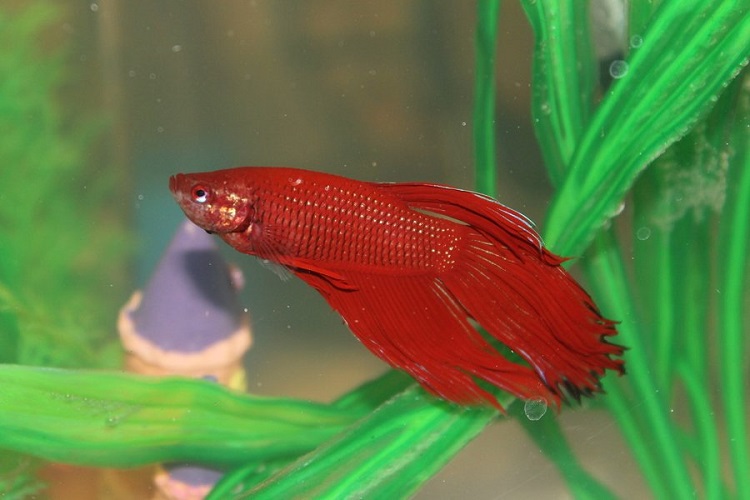
The primary cause of Ich is introducing an infected living or non-living item into your tank. Examples of situations that can cause an Ich infestation include:
- New fish
- Contaminated plants
- Filters from other tanks
Complicating matters, you might bring home a fish that shows no signs of Ich, adding it to your betta’s tank. But since betta fish don’t get along well with other fish, the addition of that fish could stress both fish out.
Since stressed betta fish are more likely to develop an Ich infestation, you could suddenly have an Ich infestation in both fish on your hands.
We’ll talk about easy ways to prevent Ich shortly. But for now, know it’s best to treat every new living and inanimate object in your betta’s tank as having Ich.
In reality, many betta fish can live their entire lives with Ich present and never suffer adverse health effects. The issue arises when situations cause your betta fish to undergo stress, making them susceptible to being affected by Ich.
Situations that can cause your betta fish to develop Ich include:
- A sudden change in water parameters
- Fighting with tank mates
- Too much noise or light
Ich Symptoms
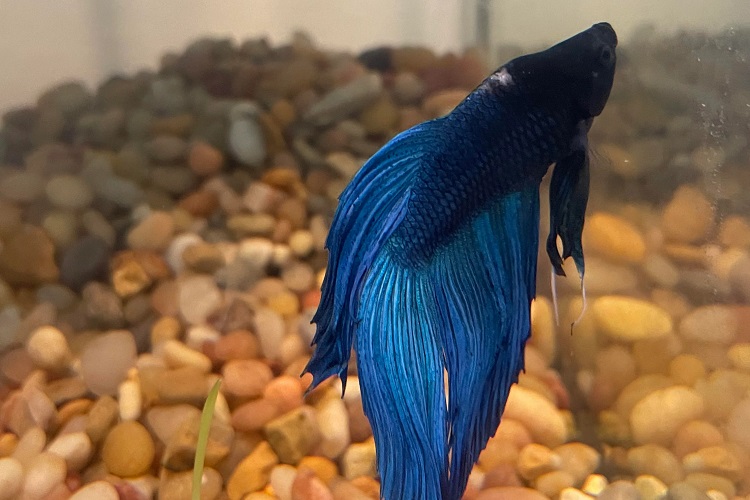
Since Ich is an external parasite, it’s easy to identify them on your betta’s body. So, the most common symptom is seeing tiny white spots speckled on your betta’s body, fins, and gills.
You might need to put your reading glasses on if you have poor eyesight since these white spots usually aren’t larger than a grain of salt. However, if your betta has a severe case of Ich, the parasites might be close together, making the “salt grains” look larger.
Aside from white spots, other symptoms of Ich include:
- Lethargy
- Itching on objects
- Lack of appetite
- Clamped fins
- Difficulty breathing
Although Ich is deadly in and of itself, your betta can undergo secondary harm by itching themselves too fiercely on objects in the tank. They do this to remove the parasites, but the result can be ripped scales and fins, opening the possibility of an infection.
For this reason, removing all objects from your betta’s tank that they can scratch on while you treat their condition is best.
If your betta is showing signs of difficulty breathing, they don’t have much time. Ich parasites have an affinity for a betta’s gills, leading to the fish’s respiratory failure if you don’t act fast enough.
Ich Treatment
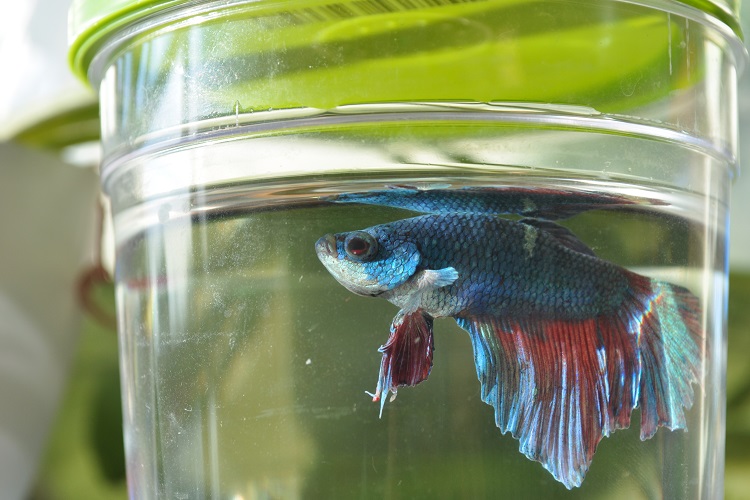
You already know that treating your betta fish during an Ich’s Theront lifecycle stage is ideal for getting rid of your Ich problem. However, it’s not as easy as it sounds, given that you can’t see the Ich during this cycle.
Plus, different Ich will be at different stages during their lifecycle at any given time. That means it’s wise to continue treating your betta fish for Ich even when it seems you’ve resolved the problem.
Below are the steps to treat your betta for Ich.
Step 1: Isolate Them
If your betta fish lives with other fish, isolate them and any other fish showing signs of Ich. You’ll then want to follow the steps below to treat both their quarantine and the original tank.
Step 2: Increase the Temperature
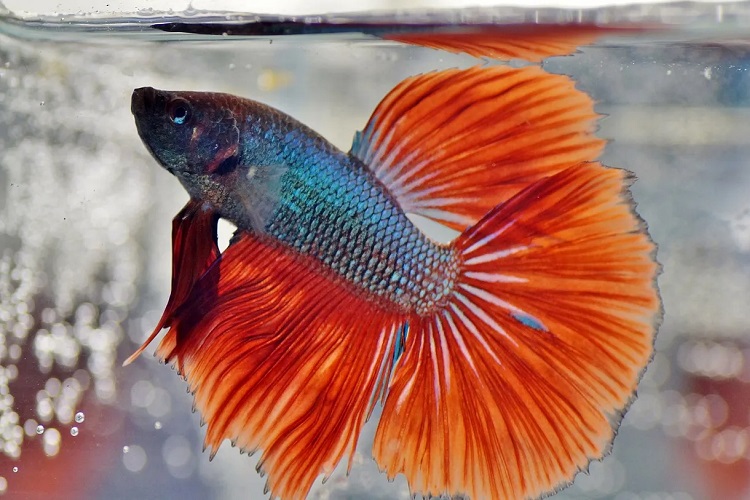
Ich parasites don’t like warm water. Although the maximum ideal temperature for betta fish is 82 degrees Fahrenheit, it’s okay to increase the temperature to as high as 86 degrees temporarily.
The key is to increase the temperature gradually. Otherwise, doing so fast can stress your betta fish, potentially causing their Ich to worsen. You should also add an airstone since the warmer the water, the less dissolved oxygen it’ll hold.
Step 3: Use an Ich Medication
Every good pet store carries medicine for Ich, and you can also purchase it online. But try not to go too cheap on this medication—Ich is a persistent parasite, so spending more money upfront is essential to take care of the problem for good.
Ich medication varies in its recommendation, so follow the instructions on the bottle. Ich parasites have a seven-day life cycle. So, even if you no longer see Ich parasites on your betta fish, it’s essential to continue treatment for at least five more days.
Step 4: Cycle the Water
Ridding old water of Ich is crucial for getting rid of the problem. Since replacing 100% of your betta’s water can cause them stress and to go into shock, you should perform these changes in 25% to 50% increments.
Swap out this amount of water daily and replace it with new water.
Ich Prevention
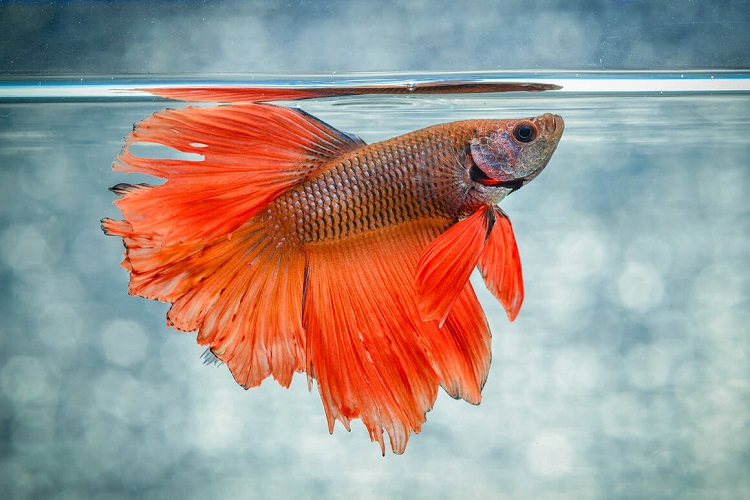
You likely arrived here because your betta fish already has Ich. But the good news is that it’s easy to prevent this parasite from returning now that you understand how it can arrive in your tank.
If you want to introduce a new fish into your betta tank, always quarantine the fish and observe them for Ich first. You should do the same with living plants and any decorations or filters from other tanks, quarantining them in a space without fish.
Keeping your betta fish in a stress-free environment is another excellent strategy for preventing Ich. In the wild, betta fish live in open marshes and ponds, so they have plenty of space to avoid fellow betas.
But they don’t have this luxury of space in a tank. So, not introducing other fish into your betta’s tank will reduce their stress levels and eliminate the possibility of an Ich infestation from a fish source.
Keeping your betta’s water on the warm end of the range and ensuring all other water parameters are ideal for them is another excellent way to prevent them from becoming stressed.
Conclusion
There’s no way to sugarcoat this: Ich can be deadly to betta fish. However, if you catch Ich early enough and follow our advice here, there’s a high chance that you’ll be able to help your beloved betta overcome this uncomfortable parasitic infection.
The good news is that if your betta fish recovers from Ich, it’s unlikely they’ll suffer from it again. That’s because bettas develop a bit of an immunity to Ich after having it.
Ensuring you continue to provide your betta fish with the correct water parameters, a quiet environment, and a balance of light and darkness will also reduce the risk of Ich by helping to keep their stress levels low.
FAQ’s
1. How can I tell if my Betta fish has Ich before the white spots appear?
It can be challenging to detect Ich in its early stages before the visible white spots appear. However, there are subtle signs that might indicate your betta is under the weather. Look for changes in behavior such as decreased activity, loss of appetite, or rubbing against objects in the tank, which suggest discomfort.
Early detection and prompt treatment increase the chances of fully recovering from Ich.
2. Can Ich spread to other types of fish in a community tank?
Absolutely, Ich is not exclusive to Betta fish; it can infect any freshwater fish if they share the same water. If one fish in a community tank shows signs of Ich, it’s crucial to treat the entire tank, as the parasite is highly contagious.
Quarantine any new fish for at least two weeks to observe signs of Ich before introducing them to your main tank.
3. Are there natural remedies for treating Ich in Betta fish?
While many aquarists prefer to use commercial Ich medications due to their effectiveness, there are natural methods you can try as well. Increasing the water temperature gradually to 86 degrees Fahrenheit can speed up the life cycle of the parasite, making it more vulnerable to treatment.
Additionally, adding aquarium salt (1-2 teaspoons per gallon) can help create an environment less hospitable to Ich while being safe for your Betta. Remember, natural remedies might be slower and require careful monitoring of the water quality and fish health.

Ian Sterling, founder of Fishlab.com, began his aquarium journey over 30 years ago, driven by a deep fascination for fish and their diverse personalities. His website, Fishlab.com, is dedicated to making fishkeeping accessible and enjoyable, offering beginner-friendly guidance, expert insights, and a community for aquarists to connect and share experiences.


